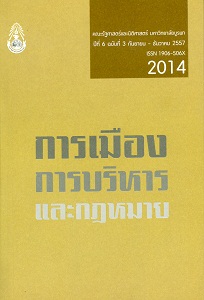การจัดการแบบปฏิสัมพันธ์ระหว่างรัฐ เอกชน ผู้ประกอบการและภาคประชาสังคม ในระบบตลาดค้าปลีกท้องถิ่น: ศึกษากรณี เทศบาลมาลัง จังหวัดชวาตะวันออก อินโดนีเซีย
Keywords:
Interactive Governance, Retail Market, Neoliberalism, Civil Society, Alternative IdeologyAbstract
การจัดการแบบปฏิสัมพันธ์เป็นแนวคิดที่เสนอถึงปฏิสัมพันธ์ท่ามกลางตัวแสดงในสถานการณ์หนึ่งๆ การศึกษาในครั้งนี้ ผู้วิจัยได้ศึกษาถึงปฏิสัมพันธ์ระหว่างตัวแสดงในกรอบของระบบการแข่งขันของตลาดค้าปลีก ซึ่งเป็นส่วนหนึ่งของแนวคิดเสรีนิยมใหม่ ระบบดังกล่าวนี้ส่งเสริมกลไกตลาดเสรีเพื่อการสร้างสวัสดิการสังคม อย่างไรก็ตาม ระบบตลาดได้นำไปสู่การแข่งขันค้าปลีกที่ไม่เท่าเทียมกัน ในหลายประเทศ ตลาดดั้งเดิมพ่ายแพ้ให้กับการมาของห้างขนาดยักษ์ซึ่งมีความได้เปรียบกว่าในหลายด้าน อาทิ การขายปลีกที่ถูกกว่า ความหลากหลายของสินค้าและคุณภาพของสินค้าที่สูงกว่า หรือการมีสถานที่อันสะดวกสบายกว่า รวมไปถึงการมีบรรจุภัณฑ์ทางอาหารที่มากกว่า ในกรณีของประเทศอินโดนีเซีย การศึกษาของเอ.ซี.นีลสัน พบว่า ตลาดยุคใหม่เพิ่มจำนวนขึ้นปีละ 31.4% ในขณะที่ ตลาดดั้งเดิมมีจำนวนลดลงปีละ 8% อันที่จริงแล้ว ตลาดค้าปลีกยุคใหม่มิใช่มีเพียงเฉพาะห้างขนาดยักษ์เท่านั้น แต่ยังรวมถึงร้านสะดวกซื้อด้วย ในปี ค.ศ. 2006 ร้านสะดวกซื้อมีมากถึง 6,465 สาขา และเพิ่มจำนวนอย่างรวดเร็วเป็น 16,922 สาขาในปี ค.ศ. 2010 สภาพการณ์เช่นนี้ได้สะท้อนให้เห็นว่า รัฐบาลอินโดนีเซียได้ส่งเสริมการแข่งขันที่ไม่เท่าเทียมกันให้เกิดขึ้น โดยที่บทความชิ้นนี้ได้แสดงให้เห็นถึงปฏิสัมพันธ์ระหว่างตัวแสดงต่างๆ ภายใต้เงื่อนไขที่ว่านี้
บทความชิ้นนี้ให้ความสำคัญกับปฏิสัมพันธ์ระหว่างตัวแสดงที่เกิดขึ้นในเขตเทศบาลมาลัง อันประกอบไปด้วย รัฐบาลท้องถิ่น นักลงทุนตลาดค้าปลีก และภาคประชาสังคม ในช่วงหลายทศวรรษที่ผ่านมา ตลาดดั้งเดิมในเทศบาลมาลังได้ปิดกิจการเป็นจำนวนมาก สวนทางกับตลาดค้าปลีกที่เพิ่มจำนวนสูงขึ้นอย่างรวดเร็ว เงื่อนไขเช่นนี้ก่อให้เกิดทั้งผลดีและผลเสียในเวลาเดียวกัน ในด้านลบ ตลาดค้าปลีกแบบใหม่ได้แย่งส่วนแบ่งทางการตลาดมาจากตลาดดั้งเดิม ซึ่งได้นำไปสู่การต่อต้านจากผู้ค้าในตลาดดั้งเดิมและนักเคลื่อนไหวจำนวนหนึ่ง แต่ทว่าในเชิงโครงสร้าง ปฏิสัมพันธ์ระหว่างตัวแสดงเหล่านี้ยังคงดำเนินไปอย่างไม่เท่าเทียมกันในการแข่งขันค้าปลีก ด้วยเหตุนี้ ผู้วิจัยจึงพยายามหาทางออกด้วยการชี้ให้เห็นถึงความจริงที่เกิดขึ้น การสร้างนวัตกรรมในการเคลื่อนไหวทางสังคม การสร้างพื้นที่สาธารณะ และการส่งเสริมระบบการกระจายอำนาจ แง่มุมเหล่านี้มีเป้าหมายเพื่อเสนออุดมการณ์ทางเลือกเพื่ออุดช่องว่างที่เป็นอยู่ในปัจจุบัน
An Interactive Governance Among State, Private Enterprise and Civil Society in The Local Retail Market System(A Case Study of Malang Municipality, East Java Province, Indonesia)
Interactive governance is a concept that argues an interaction among actors happened within a certain system. In this study, researcher examines an interaction among actors in the frame of retail market competition system. This system was inherently neoliberalism. It supports free market mechanism for achieving society welfare. However, it precisely creates an imbalance retail market competition. In several countries, traditional market was bankrupt in competition with supermarket. Supermarket has several eminence compared with traditional market. It tends to charge consumers with lower prices, offer more varieties of products and higher quality products than traditional retailers, has more comfortable place for shopping. Besides, it has their own distribution who supply them with a good quality food package. (Daniel Suryadarma et al., 2007, p. 3) In Indonesian case, a study by A.C. Nielsen reveals that modern markets are growing by 31.4% a year, whereas traditional markets are decreasing by 8% a year. (Taufik Ahmad, 2007, pp. 29-30) In fact, modern retail markets refers to not only supermarket but minimarket also. In 2006, the number of minimarket was 6,465 outlets then in 2010 the number of minimarket rapildy grow reached 16.922 outlets. (Yohan Rubiyantoro, 2011, p. 1; Ade Irawan, 2011, p. 1) Such condition reflects that Indonesian government prefers to support imbalance retail market competition.
This paper show how the interaction actors should be established facing such condition. This paper focus on the interaction of Malang Municipality actors in the local retail market system. Those actors included local government, modern retail investor and civil society. In the last decades, in Malang Municipality, the establisment of traditional market was stopped, but since last decades the establisment of modern retail (supermarket, minimarket and mall) grow rapidly. The presence of modern retail has gave positive effects, but also negative effects. It has grabbed the market share of traditional traders. Facing the condition, traditional traders and the other activist held the protest against its presence. But the structure, the role of actors and the form of interation still produce systematically an imbalance retail market competition. Thus, researcher tries to create a systemic solution by proposing several important aspects such as the redefinition of reality, innovation in social movement, public spheres and decentralized systems. Those aspects reinforce each other to produce potentially alternative ideology which protecting the weak.






